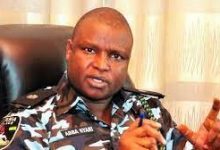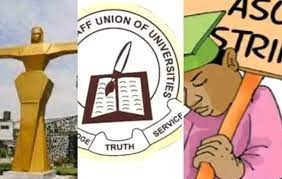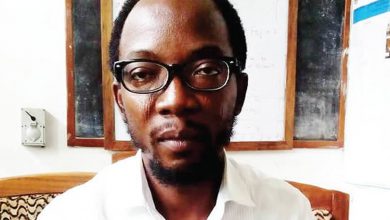Abia doctors facing hardship over unpaid salaries –NMA chair

Dr. Isaiah Abali, chairman of the Nigerian Medical Association in Abia State, talks to CHUKWUDI AKASIKE about the unpaid salary of medical physicians in the state and other problems.
Abia State’s medical professionals have being unpaid for many months. Where do your members who have been working without pay stand right now?
When you include in the September paycheck, the physicians at ABSUTH (Abia State University Teaching Hospital) are due around 18 months’ worth of pay. This means that rather than 26 months, it is just 18 months of back pay. The ABSUTH resident physicians are due 25 months of pay.
Doctors are respected in every culture, so the fact that they have not been paid in almost two years is shocking. The Abia State NMA apparently has nothing to say about this. The question is, why is this the case?
Some people feel strongly enough to oppose this. We have discussed this matter in depth with government officials and other interested parties. I’ve tried various organizations, including the Nigerian Medical Association and the Association of Basic and Secondary Education Personnel in the United States of America (ABSUTH), but each time we’re given empty promises that never materialize. Keep in mind that the general hospitals and their physicians, as well as the Health Management Board, are all far over their retirement age; they are now due 13 months, and by September will be owed 14 months.
Do you worry that if physicians in your state don’t get paid, they’ll go on strike for a long time?
Since last year’s April, the resident physicians at ABSUTH have been on strike. I’ve heard that the national organization representing medical residents, the National Association of Resident Doctors, plans to invite its colleagues throughout the South and Southeast to join the strike, expanding the walkout beyond the current facility. No doubt that will have a greater effect. But I doubt that the resident physicians will be appeased if they got the equivalent of seven months’ pay today (Tuesday). As I am not a part of NARD, I cannot say.
How has your NMA branch’s doctor’s stamp helped reduce quackery in your state?
Many hospital patients don’t require the stamp; they are treated and go. Medical reports need stamps. People use the stamp to identify who is a doctor, but most people in Aba, where I live, don’t mind; they go where they can receive services cheaply. So quackery flourishes. Some quack facilities may be registered hospitals. A doctor may register a hospital under his name and then lease it out. It’s like everyone traveling to Saudi Arabia, the UK, the US, etc. The doctor may then lease the facility to an experienced nurse. A nurse practicing medicine is obviously a quack.
Some nurses may buy a hospital and have physicians register it. Hospitals may be registered, but the manager may not be competent. Some don’t register. They call it hospital or clinic. Others register as non-hospitals. Example: a drugstore. Even pharmacists administer treatment for high blood pressure when asked. That’s quackery since pharmacies can’t prescribe medications under current legislation. Prescribing medications is quackery. Even lab workers who do tests and list drugs and prescriptions are doing wrong. Quacks are complex.
Is the NMA doing anything to decrease quackery?
We’ve done certain things before. We once caught a guy working as a doctor at a mission hospital. When we heard the news, we had him detained by the police. On questioning, we discovered out he had a University of Port Harcourt diploma, but he admitted he only took his friend’s certificate to an artist, who replicated the paper with his name on it. I was state NMA secretary, not chairman. So we had cops bring him to court. I don’t know how the case finished since it was continuing when we left.
How is Abia State fighting monkeypox? Is the state making COVID-19-era progress?
Monkeypox isn’t well-known. There are jingles, but I don’t believe they compare to COVID-19. COVID-19 isn’t like monkeypox. Some individuals are unaware of monkeypox. The effort is ongoing, but its effect is nothing compared to the Ebola virus campaign; everyone knew about Ebola compared to monkeypox.
How are Abia’s public hospitals?
Abia State’s public hospitals function. Only the Association of Resident Doctors is on strike. Others should be working. But there are few activities compared to what should be there.
Payroll issues?
Nonpayment of wages causes frequent strikes. Tomorrow we’re on strike. Many people don’t trust the system. As a surgeon, I wanted to operate on one guy last year, but he feared I would go on strike and chose a private facility. I promised I wouldn’t abandon or send him to a private hospital. I’ll care for a private hospital patient. No idea what he did. He opposed surgery because we may strike thereafter.
How are Abia’s public hospitals?
I haven’t visited general hospitals, but where I work has great facilities. It’s not the finest, but if its capabilities are used correctly, they can help the people. Poor use is the issue. Also, improper upkeep. Some facilities with technical issues are abandoned, and when accreditation is near, they seek for broken equipment and a repairman. After certification, the equipment works for the first time, then everyone abandons it. Poor maintenance culture is a problem.
Doctors allegedly adore going on strike since they can always work at private hospitals. And you?
Our private hospitals are busier than public ones. In a private hospital, a surgeon may do 100 or 50 surgeries per year, but in a public hospital, only 20. More individuals go to private hospitals, not because you discouraged surgery. It’s not true that physicians strike to work at private hospitals. The government should pay wages. Our Chief Medical Director says unpaid physicians will be sanctioned. You can’t owing wages and keep making excuses.
Unpaid wages causing you members trouble?
Yes, I rode a keke from Bata to Ogbor Hill in Aba. As I moved, I spotted a staff worker walking around the post office. Since I was utilizing a drop, I wanted to pick her up. I suggested she may be doing something on second thought. So I went where I needed to go and did what I needed to accomplish. I saw the same individual hiking when I returned. When I asked her why she was walking so far, she stated she was broke. If a person is stressed today, she will be fatigued and not want to work tomorrow. When unpaid workers can’t meet basic necessities, it’s a problem.
I once accompanied a doctor for accreditation. The wife phoned to report their lone daughter was sent home from school for unpaid fees. The boy cried. I reassured him. When they are on strike, someone is attempting to deflect attention from the concerns. The greatest thing to do is pay them; if they don’t perform their task, fire or discipline them. Our members haven’t been paid in months, which is difficult. People occasionally phone to report they haven’t paid their rent and their landlord is after them. They beg for a loan to pay the rent. People are struggling.
Dr. Uwadinachi Iweha, 74, was abducted in Umuahia. What happened to him?
He’s still missing. So he’s missing.
When was he kidnapped?
To put things in perspective, he was taken captive four months ago, in June.
In what ways have people tried to secure his freedom?
Although I was not among the first to take action to secure his release, I did eventually find that at least three or four separate security agencies were at work, including the state police, the DSS, and a special team that answers directly to the Inspector General of Police. About three or four separate groups were trying to find and save him. The village’s traditional leader eventually sent young men and women to accompany the hunters as they combed the surrounding jungle. They were ordered to look in any possible hiding place the doctor may have been in. Even after extensive looking, they couldn’t locate him. If they were really out in the woods at the time, it’s possible they would have relocated. After his kidnapping on a Sunday, the kidnappers demanded a ransom of, I believe, N60 million, which his family eventually bargained down to about five million dollars and paid by Monday night. The kidnappers gave the family a location to meet them to get their loved one. Even after spending the night and waiting until dawn, his loved ones were unable to locate him. Immediately, they began to sound the alarm.
When it comes to breaking the Hippocratic Oath and other ethical lapses, what percentage of your membership has been disciplined?
Since I’ve been state NMA chairman, I haven’t seen any violations thus far.
Can you make a connection between the rise of folk doctors and herbal remedies and the rise in self-medication?
It’s not self-medication in the strict sense since they’re getting the medications from doctors and nurses. Patients (and their advisors) discuss the medications before anybody takes them. Self-prescribing, -acquiring, and -administration constitute the pinnacle of self-medication. The second minor case is when a patient is instructed to take a medication twice daily but instead decides that three daily doses would be more beneficial. In this case, the patient is not following the doctor’s orders to the letter. To each his own, the patient seems to be taking care of himself. When considering the problem of African medicine practitioners and the like, I cannot claim that the patients are engaging in self-medication since they must travel someplace to get the drugs in question. The only concern is the question of proper dose and safety. In certain cases, the recommended dose is missing. Again, most of their medicines are not put through the same rigorous safety testing as gold-standard pharmaceuticals. Many attribute the rise in kidney failure to this, and this is one of the main reasons why.
To that end, what words of wisdom would you provide to folks who often see quacks?
If we ever meet, I’ll let them know that in conventional medicine, we treat dislocations, femur fractures, and tibia fractures all differently, but that the end outcome will be the same no matter what. Therefore, if you are unwell, you should inquire as to where you will get standard treatment, have any necessary tests done before treatment, and then proceed to acquire a specific drug that will heal typhoid, ulcer, and other ailments simultaneously.
Doctors at public hospitals are blamed for driving up healthcare costs because they send patients to their for-profit facilities. Do you have any thoughts on this?
The fact is that there are individuals who do refer, but they are in the minority since most people are not partaking in such behaviors. In a teaching hospital, for instance, patients know they will have access to every available expert because of the institution’s status as a public teaching facility. The other is that public hospitals are often less expensive than private ones. But there are also apprehensions on the part of the public. When someone visits a private hospital, they would be asked to put down a N100,000 deposit. They will begin working from that sum until it is depleted. However, this is seldom done in public hospitals. They will instruct you to pay for your medications at the pharmacy (N2,000 each) and then hand them over to you. However, because to the large number of individuals waiting for the medicine, you may have to wait in line for up to 30 minutes. That’s why some individuals avoid public facilities and go straight for the private sector when they need medical attention.
Join our 100,000+ members and never miss our members’ exclusive Delsu Breaking News.
Gain Access to Our Private News Room
Popular Stories right now
- I won’t govern from Dubai, Tinubu mocks Atiku
- Flood overtakes Lagos community, govt decries illegal structures
- Kerosene price soars by 118%, fuels anxiety







